I really won't get into the whole portrayal of Asians in American media, as it's a touchy subject and has been covered countless times before by writers much more educated on these things than I am. However, suffice it to say that there are a scant few Asian stars in Hollywood at all, and when they are in films, their nationalities are chosen at random, and they are limited to playing stereotypical parts like "the kung fu master", "the demure geisha", "the awkward math genius friend", or "the scary Japanese girl terrorizing Americans". When you see an Asian at all... often the parts are re-cast to star white actors. So it's hard to find a good role model, a leading man doing awesome things (non-martial-arts-related) who just happens to be Asian.
This sort of thing is not new. Back when movies were first getting really popular, silent films and then the subsequent "Golden Age" of Hollywood, quite a few films included an Asian character. And since this was the movie industry's first big chance to enrapture their audience with resplendent images of exotic Asian locales, they didn't simply move the picture to an American location and re-name everyone to make them American. Very few foreign or foreign-looking stars found success, however. Perhaps the most famous silent film star, and one of the only foreign men to attain romantic lead status, was Rudolph Valentino.
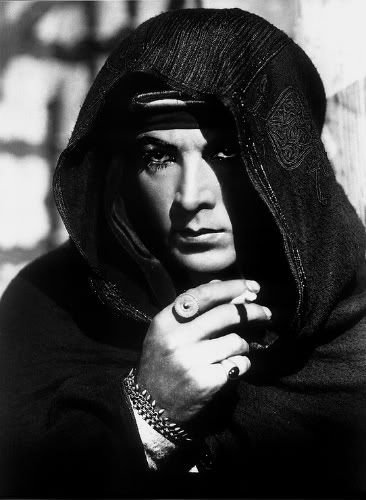
Yeah, that guy, the one with all the eye makeup. Women lusted after him, some even committing suicide when they got news of the actor's premature death, and his roles as a Spanish Matador or Arabian Sheik or the like coined the phrase "Latin Lover", first used to describe Valentino's appeal. Of course, the moral society of the time didn't like seeing foreign men taking away their white women, so often Valentino would have to play over and over again opposite the few Italian/Spanish/etc. actresses in the roster, or eventually sacrifice himself to return the girl to a man of the proper, ie, same, race, or, in a flourish of Shyamalanian proportions, reveal himself to actually be a white European in disguise... somehow. Those "foreign" actresses I mentioned that he often had to star with were hired for the sole purpose of starring with him, a luxury afforded to one, maybe two other "foreign" stars.
The problem was that the studios wanted to make money, and with no real Asian actors having a big star name, a film full of nobodies, Asian or otherwise, wouldn't draw audiences. Also, during one of their psychological surveys that they so often conducted to predict trends and the biggest successes, audiences complained that they didn't like seeing white actors playing Asian with Asian actors doing stereotypical bit parts in the background, because it made the white actors' yellowface look extremely inauthentic and distracting. The studios' solution? Fine, just re-cast everybody with white actors!
So we ended up with big-name stars granting us little gems of thespian nuance like these:
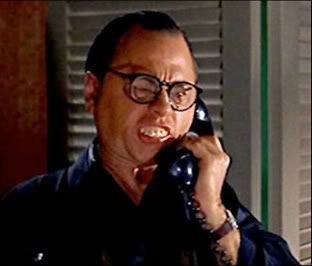
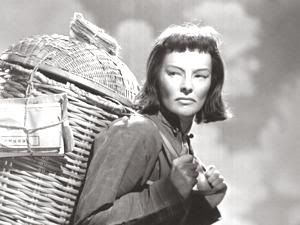
(Mickey Rooney, Katharine Hepburn)
Oh,that's nice.
It's not as if this practice has gone away, but Asian-Americans are just such a minority, and today most major movies are still just star-vehicles for the big name to stand there looking hot and doing nothing, that it's really a battle of principle instead of a want to see Asian actors taking on roles that require acting talent. But I digress.
I'd like to introduce you all to a Hollywood star from Japan who not only played the romantic lead, but did so with such sheer talent and complete disregard for "what was expected of him", that he became one of the top draws of Hollywood cinema.
Sessue Hayakawa: Hollywood's Asian Superstar That You've Never Heard Of
I'd like to preface this entry with a note.
While my usual "history lesson" entries take place in the history of old, this still constitutes as a "history lesson" style, since it was roughly 100 years ago, and, while being little-known, it is also important to understand the context and time period to appreciate what was happening and how significant it is. And while I am a fan of Hayakawa's life, and have seen several of his movies, for the whole history behind everything I have turned to a friend of mine, a silent-film enthusiast and fellow Hayakawa fan, to garner a lot of insight into his acting style and the things one should know about silent film. The note stands thus: it quickly became clear to me that, as I questioned her about this and that, she really gets the appeal Hayakawa possessed, as she encapsulates the adoring ladies who flocked to see his films a century ago. While I generally disregard such fangirlisms, on many occasions, she made a very fair point, and the admiration she holds for him provides a good context for what I think a modern reader (you people) should know about him from a different point of view than my usual "He is just so cool!" standpoint. All of that up there essentially boils down to, if you're getting the impression that the author of this entry has a major crush on Sessue Hayakawa, please keep in mind that this is a joint effort between myself and a lady who does have a major crush on Sessue Hayakawa. Thank you.
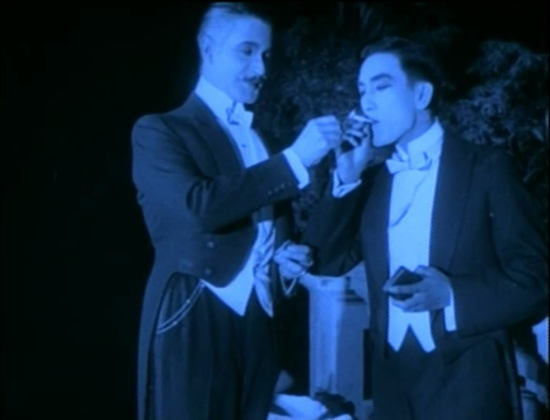
She assured me that everyone would enjoy this photo.
Also, before I begin, I'd like to warn you all that this man has lead one of the greatest lives there ever was to lead, and all of the preceding is 100% accurate. Forget Chuck Norris Facts, forget even Mifune Toshiro Facts. Sessue Hayakawa Facts are more awesome, and true.
He was born in Japan as Hayakawa Kintaro, 早川金太郎, in 1889 (some sources say 1886... exact birth years were generally hard to come by back then). His family were wealthy descendants of a samurai clan. Being able to trace one's lineage back to samurai at this time was a very big deal. His father was the governor, and had high expectations for his son. Hayakawa spent his early life preparing to be a Naval Officer, even going on to study at the Naval Academy. One day, when he was about 17 years old, he was dared to swim to the bottom of a lagoon, and in the process, he ruptured his eardrum. The entire side of his head became swollen and infected, and as a result, he failed the Navy's physical.
He returned home, where his family's embarrassment and his father's estrangement of him filled him with intense shame and loneliness. Hayakawa, in honour of his samurai heritage, decided that the best course of action was to commit seppuku. He locked himself in the backyard shed, tied his dog outside, and prepared to kill himself. He spread a white sheet on the ground and stabbed himself in the stomach over thirty times. The dog started barking, which alerted his parents, and his father broke in through the door with an axe. Hayakawa lived.
Despite being so young, this kid did not play around. Already his life was the stuff of legend, and we haven't even gotten started yet.
His parents decided that shutting out their son was clearly not the way to go, and, brushing the crisis under the rug, turned to the Asian Parent Wheel of Lucrative Careers For One's Child, and it was settled that Hayakawa would study abroad in America to become a banker. At the University of Chicago, he played as quarterback for the football team. He was flagged from a game for defending himself against a tackle with jujutsu.
After graduating, Hayakawa was to return to Japan. He went to Los Angeles to await a boat back home, but was drawn in by the lights and glamour of Hollywood. Well, not exactly. He visited a theatre in the Little Tokyo District, and became interested in acting. He began writing scripts and performing. It was then that he adopted his stage name. Wanting to pay tribute to "the last true samurai", Takamori Saigo, whose nickname was comprised of the kanji for "South" and "Country", Nanshu (南洲), Hayakawa played on it with the characters for "North" and "Country", Hokushu (北洲). However, this name was already taken, so he eventually settled on Sesshu, using the characters for "Snow" and "Country", 雪洲. He romanised it as "Sessue", thinking that it would be easy to remember, meant to be pronounced "Sesshu". Unfortunately, he was constantly plagued with mispronunciations, Americans pronouncing it "ses-su" and Japanese reading "ses-su-eh". So please read "Sessue" as "Sesshu".
He was soon set upon by the famous and innovative film director/producer Thomas Ince, who wished to give him a bit part in a film starring an actress from the theatre, Tsuru Aoki (青木 鶴子, Aoki Tsuruko).
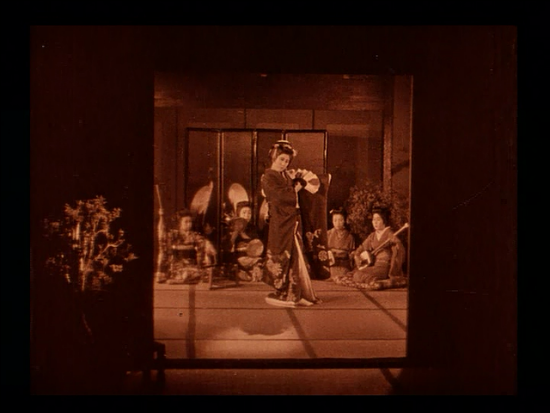
He also wished to produce a film version of the play Hayakawa was currently starring in, The Typhoon. Ince assured him that it would be a full silent motion picture, starring all actors of the original cast. Quickly seeing this whole acting thing becoming a much bigger part of his life than he wished, Sessue informed Ince that he just wouldn't be able to star in a picture for anything less than $500 a week. This is the sort of money that those being groomed to be top stars were garnering, a ridiculous gambit sure to dissuade Ince, for who would pay that kind of dough to an unknown, a foreigner, and an Asian at that? Ince immediately agreed to the salary.
Hayakawa made several films with Ince, starring himself and the actors from the theatre. One of them, a fantastic film called The Wrath of the Gods, looks different than any other American film at the time. While a California beach was used as a stand-in, they actually did an amazing job recreating the look and feel of a Japanese island village, Japanese characters addressed in a straightforward manner, with different emotions, costumes, and characterization, rather than interchangeable Asian extras. Even more groundbreaking, the romance is between an interracial couple, actually depicted by interracial actors whose love doesn't end up being condemned in favour of sticking with one's own race (though her Buddhist beliefs are sacrified in order to appease the heavy Christian morality and sentiment at the time... still a big leap for a film from 1914). The film starts off with the ensemble of the Japanese Playhouse coming out on a Noh-like stage in traditional formal clothing, bowing as their nameplate is shown, and then "fading" into their character's clothing and makeup.
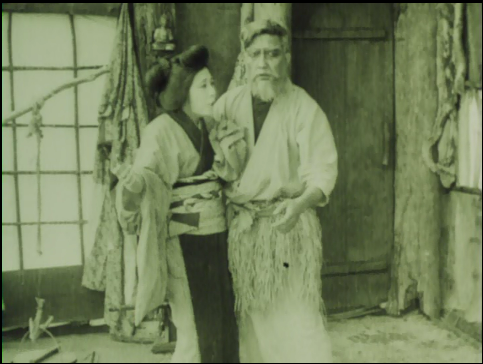
Hayakawa plays a wily old man, the father of Tsuru Aoki's character.
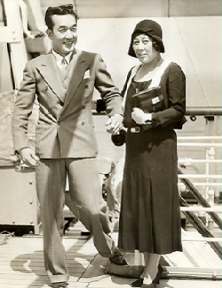
He and Aoki married shortly before the film was released.
Hayakawa soon signed to Famous Players-Lasky, the major production company that would one day become Paramount Pictures. He was then given a leading role in a film called The Cheat, directed by Cecil B. DeMille.
The Cheat was Hayakawa's breakout role, and I'd like to go through a few points of it to illustrate just how groundbreaking it was. Released in 1915, it starred a husband and wife duo different than Hayakawa and Aoki, Fannie Ward and Jack Dean. Fannie Ward's character is used to her luxurious lifestyle, and overspends her husband's money to maintain an image of high class beyond her means. One day, she secretly gives her club's charity 10,000 1915 dollars to a friend of her husband to put on a stock tip, and loses it all. Terrified of the repurcussions, she goes to her friend, a wealthy foreign merchant, whom the local society is kissing up to because of his wealth. He also has a serious thing for Fannie's character, Edith Hardy.
Hayakawa plays Hishuru Tori, a wealthy Japanese man. However, many fans were upset by Hayakawa and the Japanese people being portrayed as conniving and unfriendly, so his character was re-named Haka Arakau, a wealthy ivory merchant from Burma.
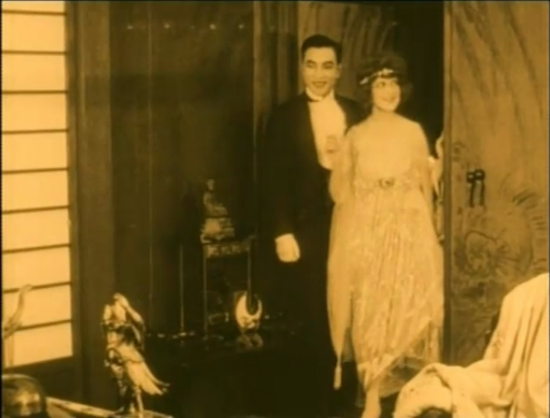
Pictured, ...Burma?
During all of Arakau and Edith's interactions, Hayakawa sleazily leers over her and unwantedly caresses her, looking at her like she's his next prize. She gently tries to dissuade him, however when he arrives in style as her husband complains to her about her spending on the phone, she plays up to Arakau's advances.
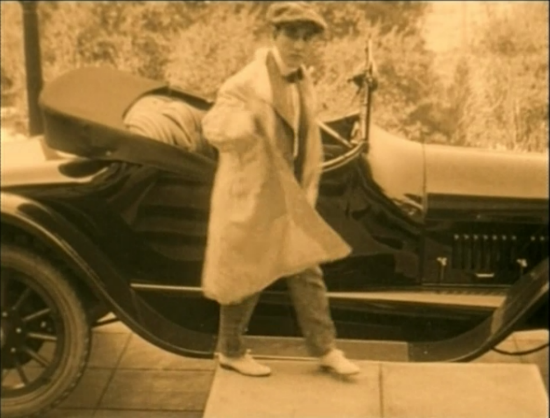
After all, look at this amazing man and his amazing car.
Edith flirts with him and admires all of his lovely Asian belongings. He sprinkles cherry blossom petals on her and shows her how he brands the bottoms of his finest pieces of ivory, because,
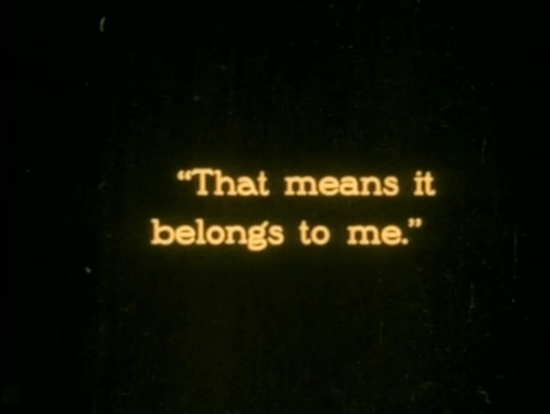
Hayakawa dominates every scene he's in, as well as dominating Edith. While most silent movies of the time showcased the "more-is-more" school of acting, huge grimacing facial expressions and manic hand-gestures, Hayakawa did almost all of his acting with his eyes. Edith faints when she discovers she's lost the money, wherein Hayakawa merely flicks his eyes over his shoulder.
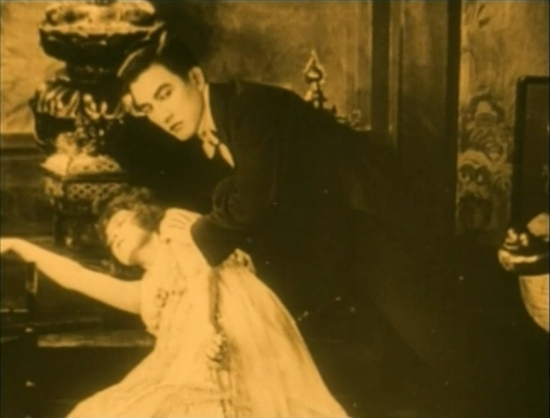
The movie goes a step further to show him drag her off and start kissing her unconscious body in secret, but that look right there told you he was a rapist right away.
Anyway, Arakau agrees to pay Edith the money for her charity ball, but she must pay him back by having sex with him. At first, she is terrified, but then she reluctantly agrees, fearing for her repuation should someone find out she gambled the cheque away.
Richard Hardy, Edith's husband, nets a windfall the next day, and happily doles out the full payment to his wife. She returns to Arakau's home that evening and tries to buy him off. Arakau throws his subtle cautions to the wind and flies into a fit of rage, beating Edith to the floor, pulling her by the hair, ripping her clothes off, and finally branding her with his torii gate seal.
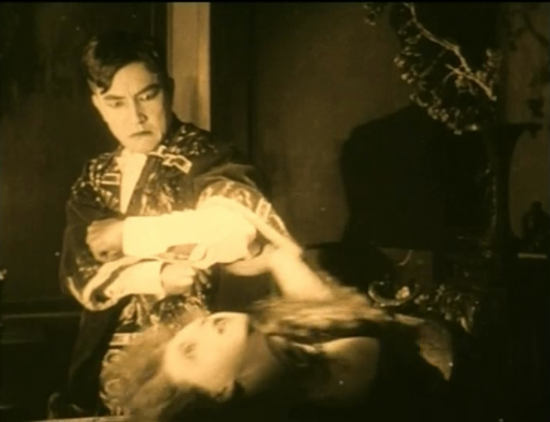
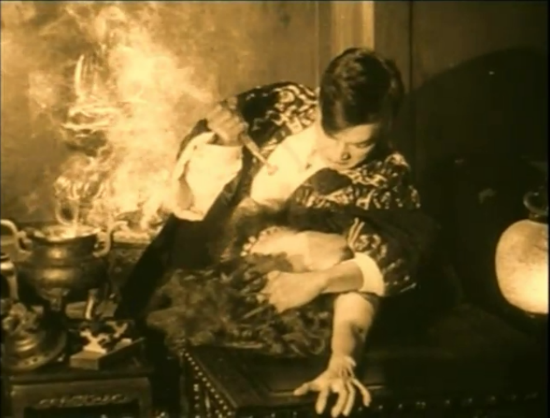
Silent movies were very liberal with their abuse of women at the time, but this scene had almost the opposite effect on the female audience. Arakau had been played so stealthily, a man with urges who was resigned to remain polite at all times, the meek Asian in the background, that, when he suddenly says "Fuck it" and showcases his lust for the benefit of Edith and the viewers, women went crazy at the idea of an Asian man being cultured, strong and masculine, and beautiful in appearance as well.
Edith stumbles over Arakau's gun and shoots him, leaving him to die bleeding against the shoji, upon which her suspicious husband arrives, understands the situation, and takes the rap for her. Arakau relates this adjusted story to the police, all the while as Hayakawa's eyes embody a dying, extremely irritated and tired look, as he is continually grilled when all he wants is medical attention.
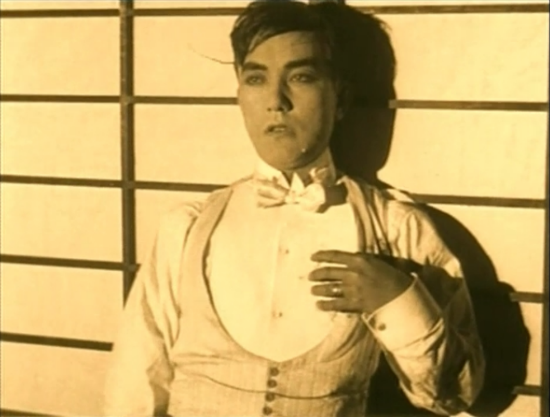
At the trial, the judge is ready to put Richard away, but Edith has a breakdown and storms the courtroom, ripping off her dress to reveal the burn, and telling everyone what Arakau did to her. The judge shrugs and says "Oh, OK, well I guess you can go then!", and Richard and Edith leave the courtroom in a parade of smiles as Arakau is rushed by an angry mob, and his doctor must take poor, ill, tired, bleeding Hayakawa to the back, and the movie ends.
Wait, what?
Let's go back and view this movie through the eyes of the 1915 audience.
While they were more than generous to show you the branding and the beat-down and the date-rape, a lot of the film speaks just to the movie-making style of the time, and there are many visual and cultural clues that were matter-of-fact and understood then that we don't know about now. There were many things that couldn't be shown in movies, so subtle acts or phrases would be supplied that the audience was to understand meant something else, but the censors wouldn't be able to find any outright allusion in.
For example, smoking meant sex. Everybody smoked back then, but when a couple would share a cigarette, or light a cigarette for someone else, it was meant to demonstrate their activities in the bedroom.
For those of you wondering, the picture way up there of Jack Dean lighting Hayakawa's cigarette also was meant to represent sex. In a roundabout sort of way. The scene in context is thus: Richard Hardy is extremely jealous of Arakau, as well as his wife's attentions to him, and as they secretly discuss their plans to have a party for her club at his home, Richard butts in on them, sends Edith on her way, and generally tries to show off how powerful and manly he is to Arakau. Arakau pulls out a cigarette case and offers one to Richard, but Richard instead lights Arakau's cigarette for him, as a man would for a woman, to show dominance. However, as Richard smiles knowingly, happily secure in his masculinity, Arakau gives just as much of a knowing smile back. The audience sees that Richard feels extremely insecure around Arakau, and goes out of his way to try to take the upper hand and prove how manly he is, when in reality he's just doing a favour for the manlier Arakau like a servant. The fact that he feels the need to do this shows that Arakau clearly has the upper hand in the relationship between Richard, Edith, and himself.
Likewise, at the end of the film, where everything just stops quickly and there's a seemingly happy ending for Edith and Richard, we are shown Arakau being hurt and vulnerable, so the female audience is meant to take his lustful rage and power manipulation, and contrast it with a man who needs them, and they subconsciously rush back into his arms, instead of the useless Richard Hardy, who does not have Hayakawa's sex appeal, since he uses, not Zen-influenced subtlety and raw emotion, but what I like to call "moustache-acting", distracting us all to think he's great by the sheer magnificence of his smart moustache.
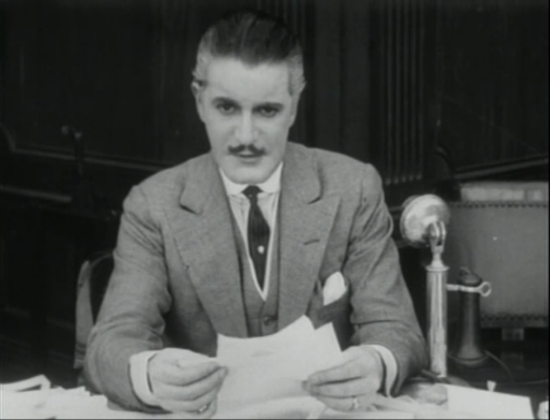
No, but, look! That guy sure can act!
The super-quick wrap up of the film is meant to constrast with the slow burn because, in silent movie code, it's not the "true ending" to the film. The morality league of the time had a series of standards and practices that had to be worked around, among those I've already mentioned was that a woman could never end up with a bad guy, and bi-racial couples were only allowed so long as the white person was eventually turned over to the true winner, someone of her own race. Because, as The Cheat put it,

Paramount Pictures: Kinda racist.
So while all the ladies in the audience were feeling that they would have run back to Hayakawa, Edith and Richard are quickly brushed aside as afterthoughts because you are supposed to take this as the actual ending, that this woman is greedy and would ultimately choose her exotically beautiful and wealthy lover over her dull and unexciting husband.
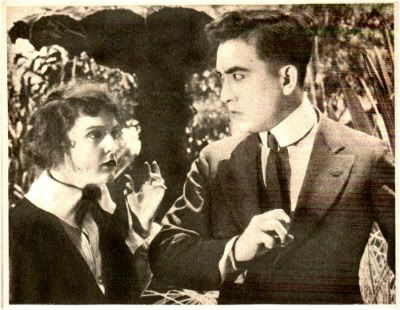
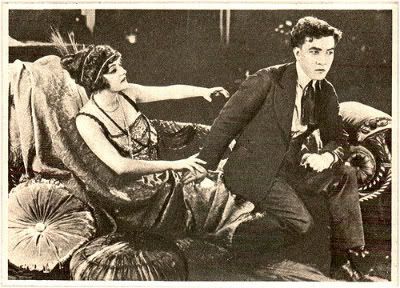
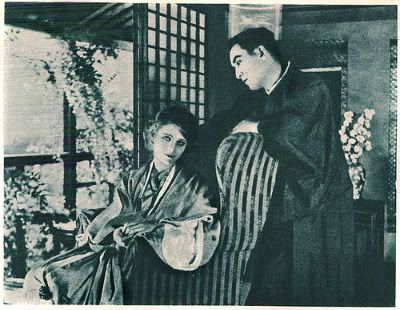
Hayakawa gets all the hot white women.
Hayakawa's career skyrocketed after this film. He became Japan's first international star, a feat that would not be recaptured until nearly fifty years later by Mifune Toshiro, and arguably has not been accomplished ever again. Women went absolutely nuts for him. Once, at a movie premiere, he went to exit his limousine, and was upset to see a huge mud puddle directly in his way. His female fans, well-accustomed to the very subtle changes to look for on screen to gauge Hayakawa's mood, went insane. Women began fighting each other on the red carpet trying to get close and pile their fine fur coats over the mud puddle for Hayakawa to walk over. He was not an Asian sex symbol, he was the sex symbol, and nearly all mention of the fact that he was Japanese or different than any other popular American star was stripped from descriptions of him.

As you can see here, he was simply known as the "Premier Male Dramatic Star". This was a really big deal.
Unfortunately, at the time, Japan was trying very hard to be international and embrace Western culture, and they viewed Hayakawa's parts in American film as "too Japanese". He was panned by Japanese critics.
To an extent, however, Hayakawa felt the same way. His roles in film played up so much on his Asian-ness, that he couldn't express an honest character. He longed to star in films that showed Asian people as they truly were, and were given good parts with interesting scripts for Americans to watch and enjoy as well. He decided to do just that on his own. He left Players-Lasky and opened up his very own production company with friend and director William Worthington, Haworth Pictures (hah-worth).
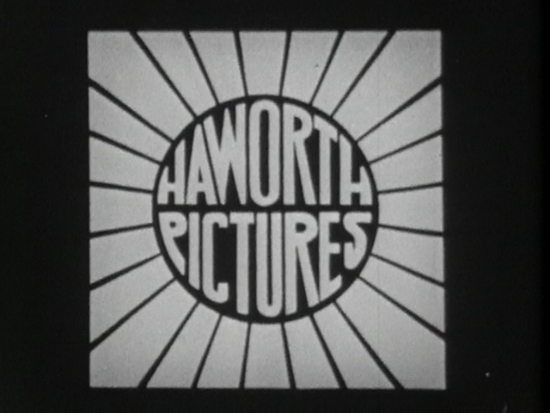
The final film he was offered at Players-Lasky was a film called The Sheik. Hayakawa was once again to play the foreign lover of a white woman, who would eventually have to give her up in favour of a more proper race. Hayakawa passed on the role, and recommended for the part an unknown actor: Rudolph Valentino. Valentino got the role, and his own legendary career began.
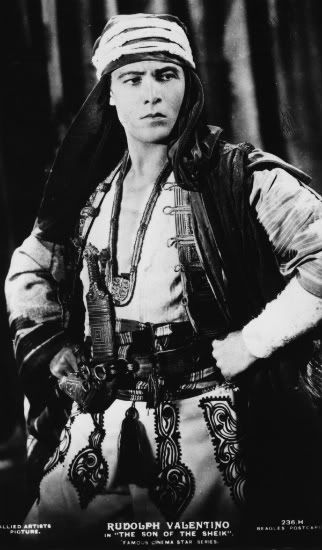
Thanks to Sessue.
At Haworth Pictures, Hayakawa starred in, produced, wrote many of the screenplays, edited, and even designed the sets of the films. He cast all of his friends from the Japanese theatre, and employed many Asian actors. He worked hard to portray a more authentic view of Asia to the American movie-going audiences.
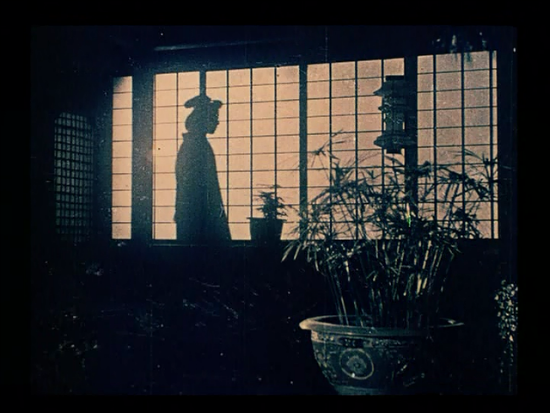
This is from an American film.
In The Dragon Painter, considered one of Hayakawa's best, he plays a deranged painter searching for what he believes is his lover from a past life, a beautiful woman who has become a dragon and hidden in the landscapes of Japan.
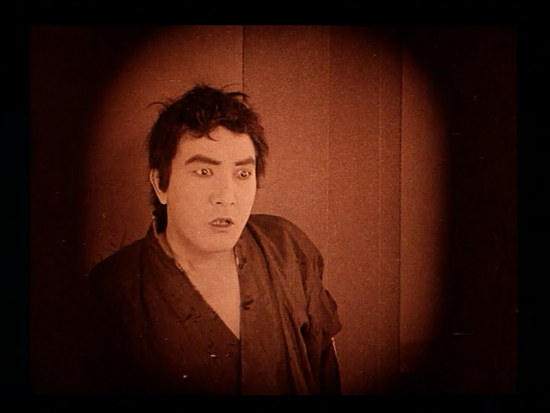
He played comedy spots in the film, throttling people and presenting a brief explanation of Japanese social graces of the film's period, and then the audience laughs as he missteps them entirely, and nobody found this too challenging or strange to grasp. He played dramatic very well, and crazy is also seen in this film, but he did do a little bit of comedy.
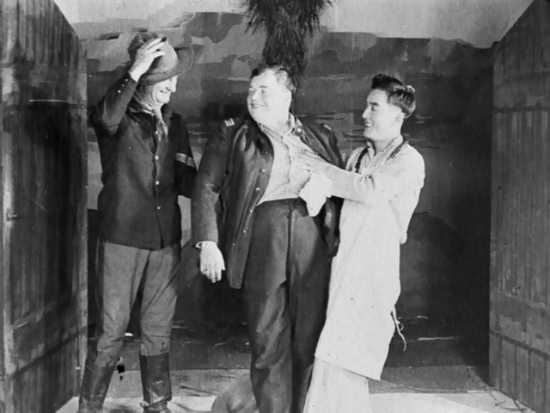
He is seen here in this short with Fatty Arbuckle, one of the most popular comedians at the time, and Hayakawa pulls a few gags and funny faces and holds his own. Back when comedians had names like "Fatty Arbuckle".
With his acting and producing salary, Hayakawa made an exorbitant amount of money. His yearly pay was second only to Charlie Chaplin, the director, composer, writer, star, and international sensation, the number one movie star in the world. The third place highest-paid actor was far off from both Hayakawa and Chaplin, whose payment was relatively closer in number.
Tales of Hayakawa's wealth were even more fanciful (and true!) than Haka Arakau's. He reportedly lost several million yen gambling in Monte Carlo, while another man who lost money that evening committed suicide. Hayakawa treated it as a drop in the bucket. The man drove a Pierce-Arrow, one of the most stylish and expensive cars at the time, plated with gold.
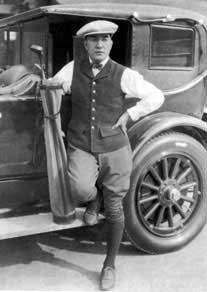
Not only that, but he also hired on a liveried footman exclusively for the car. Shortly after, old Fatty Arbuckle bought a gold-plated Pierce Arrow as well, and Hayakawa, uninterested in owning a car that wasn't one of a kind, donated the vehicle (and also probably that liveried footman) to the Long Island Fire Department.
He bought a mansion called Glengarry Castle in downtown Hollywood. Reportedly, the inside was decorated as a Japanese castle, and the outside really was an actual fucking castle, renowned for his wild parties (Hayakawa bought a large amount of liquor right before Prohibition, and credits that to his popularity, but I think it's because it was a fucking castle).
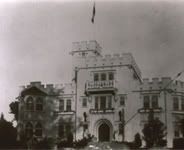
Here is a photo of Glengarry Castle before it was torn down. It was the first stop on the popular "Hollywood's Homes of the Stars" tour.
One of his favourite stories to tell took place during the filming of one of his productions, The Jaguar's Claws. Hayakawa was playing a Mexican bandito, and many of the extras were cast as cowboys, bouncers and bodybuilders. During a break, many of the cowboys started getting drunk, and refuesed to return to work. Hayakawa swaggered up to them and told them he was going to fight them. No polite asking to return to work, Hayakawa knew that there was ass to kick, and he was just the man to do so. Several men stood up and a few swung at him. He dodged the first man, knocked a pair off of their feet, and then flipped a fourth over his shoulder to the ground, where the extra was rendered unconscious. The crew applauded this show of strength, some of the men having a foot and one hundred pounds on Hayakawa, and everyone returned to work without any more fuss.
Unfortunately, with growing anti-Japanese sentiment, business became harder and harder for Hayakawa, and he was forced to close his production company and left America. He travelled to Europe, which was experiencing a love of all things Asian, and he acted on stage, in several films, and wrote a novel. A play, Samurai, was written especially for him, which he performed for the King and Queen of England.
Hayakawa returned to Japan, which was now experiencing a very traditional national-pride outlook on things. Of course, now they found that Hayakawa was just too American, a Western star, and he was panned by critics. Oh, Japan, you're so funny sometimes.
By now it was the 1930s, and American films were undergoing a complete overhaul with the advent of sound pictures and the implementation of the Hays Code, an extremely strict lay-out of rules for films, such as: no passionate kissing or romance outside of married couples, no mixed-race couples at all, all villains must meet with punishment, etc., and must meet all standards by censors or the film would not be released, no exceptions. Basically abolishing all the steps forward Hayakawa and others had fought for to be portrayed in American cinema, and having to play roles that were degrading or small for such a big star, Hayakawa still starred in a few features. His accent was met will unfavourable reviews, and shortly after completing the films, he returned to Europe to tour and star in some feature films starring alongside some of the most famous actors and actresses in Japanese cinema.
While filming in France, he became trapped by German occupation, and was unable to return home, where his entire family (Aoki and their three adopted children) were separated from him. He supported himself by selling watercolours, and joined the French Resistance Movement.
In 1949, Humphrey Bogart enlisted his production company to find Hayakawa and offer him a role in his newest film, set in Japan. Hayakawa was subjected to a background check for his wartime activities, where he was pronounced a patriot and went back and forth from America and Europe to act in several films at this time. While he was still playing the villain, as most roles were set during WWII, he was still portrayed as well-spoken, cultured, fair, thoughtful, intelligent, capable, a veritable grey area of "bad guy".
Now, he's best-known for playing Colonel Saito in the film The Bridge on the River Kwai.
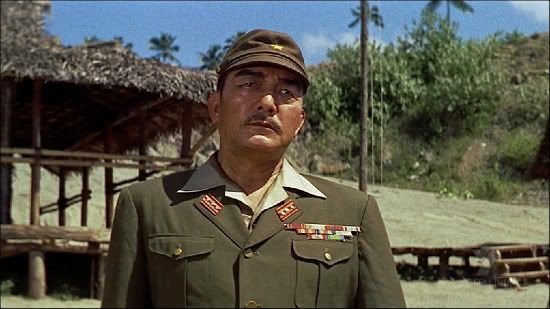
This film captures the type of roles he played during this era, and Hayakawa was even nominated for an Oscar, one of only eight Asians to ever recieve this recognition. Hayakawa said it was the best role of his career.
He acted sparingly until 1961, when Tsuru Aoki passed away.
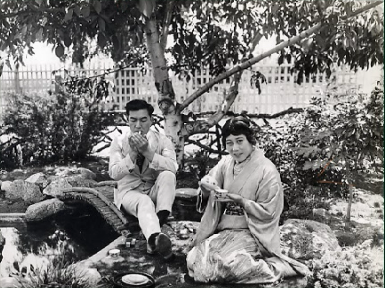
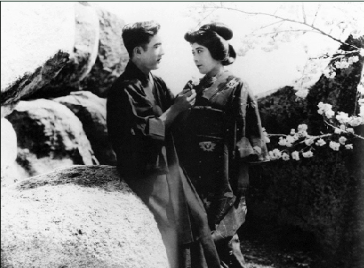
Returning to Japan, Hayakawa became a Zen master. As in, to become a Zen master, one must study and will not be ordained with the title until his teacher professes that the student has achieved an intensified level of clarity and discovery through meditation.
Appearing in a few more films, and working as a private drama coach, Hayakawa spent the last few years of his life studying Zen, writing about its influence, and penning a few novels as well. He passed away in 1973.
Sessue Hayakawa was an amazing actor, who led a life at times even more exciting and unbelievable than any of his films. I believe the level of success, fame, and public adoration he recieved internationally has never been accomplished again. The steps he took to spread knowledge, interest, tolerance and love of Japan in American cinema inspires me greatly, and I am grateful to my friend and her knowledge of silent cinema, for the huuuuge wall of text we've just completed detailing his life and his work. While The Bridge on the River Kwai was an excellent film, Hayakawa should certainly be remembered for it as well as his storied career in the silents. The way Asians were viewed then seems antiquated and not PC, but I can't imagine a Japanese actor being received in America the way he was at present.
Hayakawa accomplished so much, and not just because of his race, but because of sheer talent as well. Silent movies really are very interesting! I used to think they were hokey and simple, but the camera tricks and plot devices and acting ability (not to mention the stunning actresses) are often more interesting to watch than many films being produced today. It's just like his acting style: less is more. They didn't have huge budgets and sets and CGI, so what you got were innovative techniques, good storytelling, and a lot of really cool experimental pictures. So I've been watching a lot of silent Japanese films, and was impressed to find films the like of which Hayakawa produced here in America (The Wrath of the Gods really was exceptional to watch, and of all the movies I screened for this entry, none of them feel dated at all to me).
Hayakawa once said, "My one ambition is to play a hero." My hope is that, while many of his films are now lost, he will not be forgotten for all the work he did and all of the great performances he gave. I think he finally did get to play a hero, don't you?
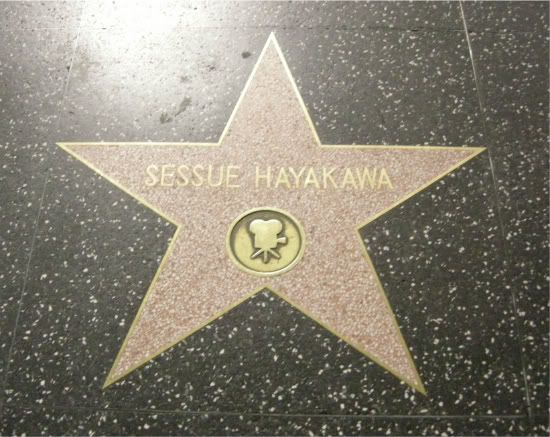
Sessue Hayakawa's star on the Hollywood Walk of Fame
No comments:
Post a Comment